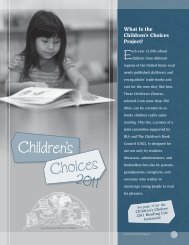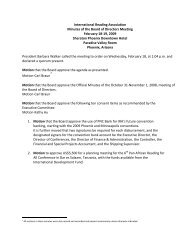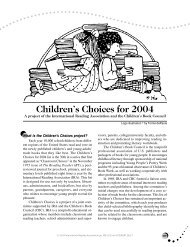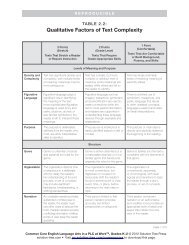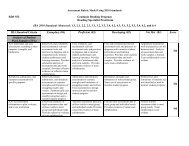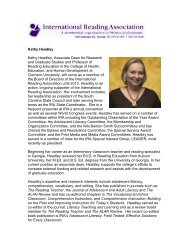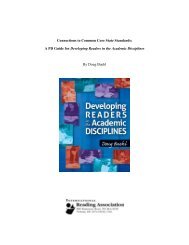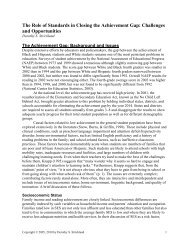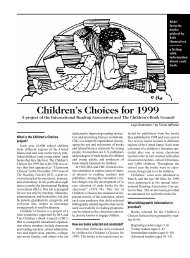Global Education Digest 2012 - International Reading Association
Global Education Digest 2012 - International Reading Association
Global Education Digest 2012 - International Reading Association
Create successful ePaper yourself
Turn your PDF publications into a flip-book with our unique Google optimized e-Paper software.
OPPORTUNITIES LOST: THE IMPACT OF GRADE REPETITION AND EARLY SCHOOL LEAVING<br />
performance is found in education systems that<br />
practice grade repetition as well as those that<br />
practice automatic promotion. For more developed<br />
countries, PISA 2009 results (OECD, 2011) show<br />
that countries performing above the OECD average<br />
also tend to practice either automatic promotion (e.g.<br />
Finland, Iceland and Norway) or grade repetition (e.g.<br />
Belgium, the Netherlands and the United States).<br />
The top three performers in the SACMEQ III Grade 6<br />
pupils’ reading scores in Southern African countries<br />
in 2007 were Seychelles, Mauritius and Tanzania.<br />
Automatic promotion is applied in the first two<br />
countries, while repetition is applied in the last. The<br />
distinction may be found in how repetition is applied –<br />
when used selectively in more developed education<br />
systems, it can help support learning; but when used<br />
indiscriminately, it can lead to high dropout rates and<br />
poorly performing education systems.<br />
Moreover, automatic promotion could represent a<br />
more cost-effective policy. The resources saved can<br />
be evaluated by comparing them to the resources<br />
invested in costly remedial classes or catch-up<br />
programmes for students experiencing learning<br />
difficulties, which typically require one-on-one<br />
attention.<br />
What is the best way to introduce automatic<br />
promotion? The experience of countries in<br />
introducing automatic promotion is varied. Grade<br />
repetition is applied in secondary education in some<br />
countries (e.g. Nigeria), from the last grade of primary<br />
education in others (e.g. Mauritius), or limited to<br />
the last grades of sub-cycles of primary education<br />
(e.g. Burkina Faso, Mali, Niger, Sao Tome and<br />
Principe, and Senegal).<br />
A gradual transition by grade/level could represent<br />
a potential strategy in countries where repetition is<br />
well-rooted in educational practice. For example, the<br />
sub-cycle implementation policy consists of dividing<br />
the average six-year cycle of primary schooling<br />
into two-year sub-cycles with no repetition allowed<br />
within each sub-cycle. When practiced alongside a<br />
system that identifies and supports weaker children,<br />
this approach has been found to increase quality<br />
(Ndaruhutse, 2008).<br />
However, there are important obstacles facing<br />
countries aiming to implement such policies. There<br />
is often a culturally engrained practice of grade<br />
repetition in certain countries, leading to a strong<br />
resistance to reform. Consequently, policy change will<br />
require meaningful engagement of all stakeholders:<br />
governments, education policymakers and planners,<br />
district education officers, school managers,<br />
teachers, teaching assistants, parents/caretakers,<br />
learners and civil society (Ndaruhutse, 2008).<br />
Policies that focus on prevention or prioritise<br />
interventions before learning gaps accumulate can be<br />
the most cost-effective. Specifically, policies aiming<br />
at building readiness to learn at an early pre-school<br />
stage or providing individual remediation as first<br />
symptoms of learning difficulties emerge or when<br />
absenteeism is observed would efficiently reduce<br />
repetition and early school leaving. This should<br />
help to diminish lost investments while leading to<br />
improvements in school retention.<br />
<strong>Education</strong>al initiatives like <strong>Education</strong> for All (EFA) or<br />
the Second Decade of <strong>Education</strong> for Africa (2006-<br />
2015) explicitly include early childhood education<br />
and development in their goals and action plan.<br />
Nevertheless, the supply of pre-primary education is<br />
still lower than demand in most developing countries.<br />
Pre-primary education can be costly and is mainly<br />
provided by private institutions in urban areas.<br />
As a result, some parents who have children of<br />
pre-primary education age (typically 3 to 6-yearolds)<br />
send them to school – often prematurely – as<br />
primary education becomes tuition-free in many<br />
countries. A number of early enrolled children may<br />
not be sufficiently prepared for school, making<br />
this experience more challenging for them. This<br />
contributes to repetition and early school leaving<br />
in the first grade of primary education in many<br />
developing countries.<br />
57




